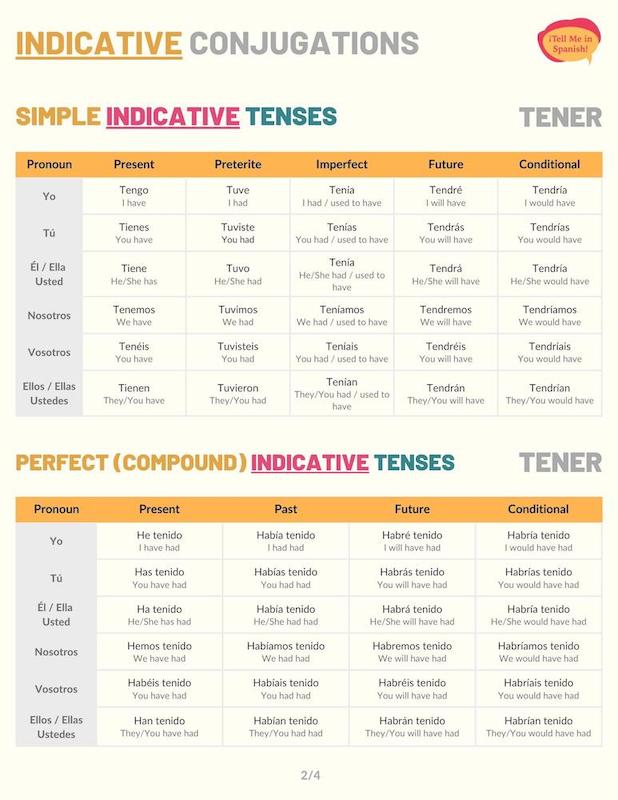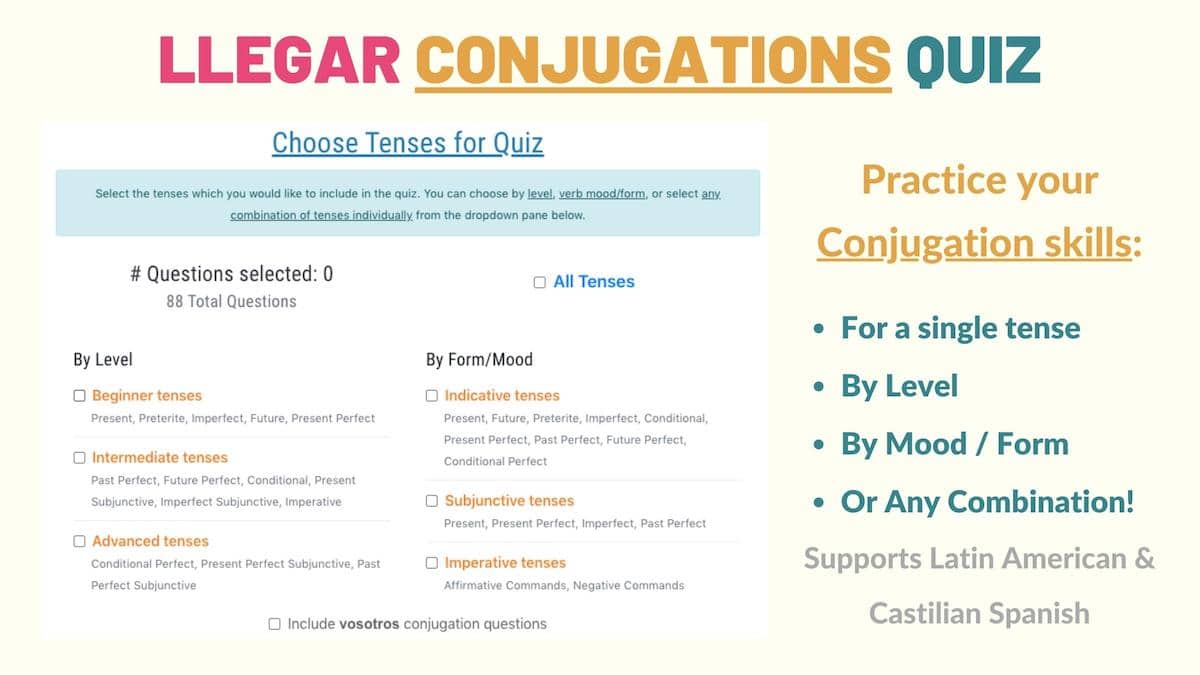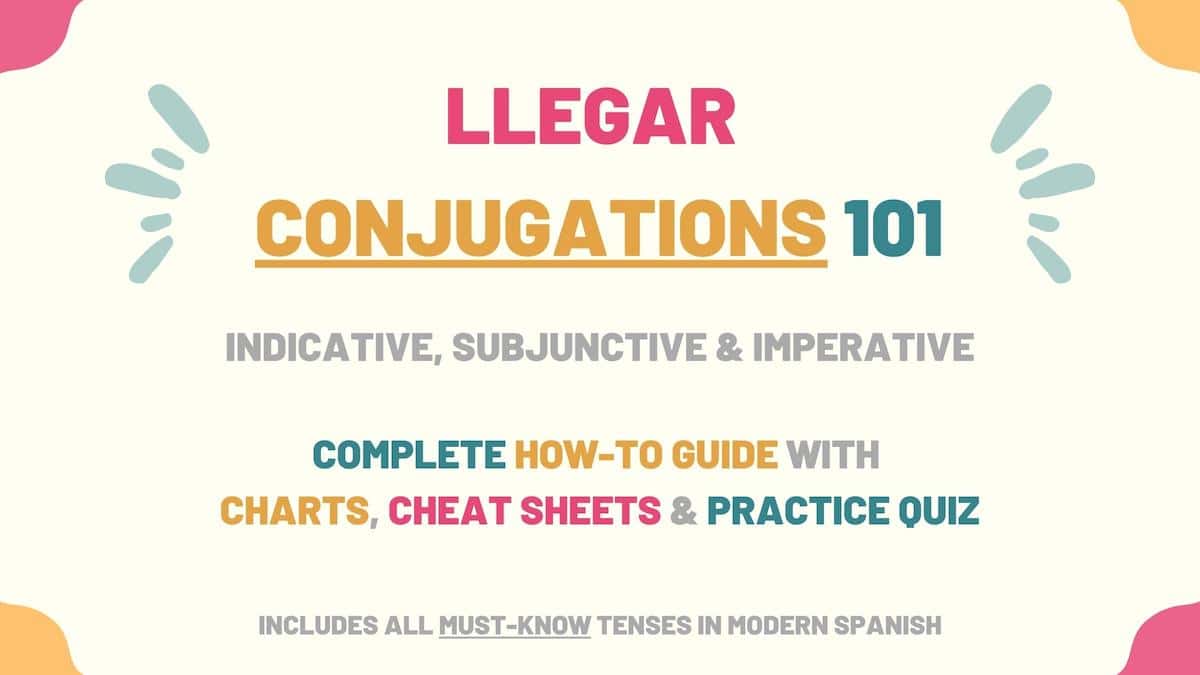Among other things, Llegar primarily is used to talk about arriving somewhere and achieving goals. Since this is a common verb that beginners need to add to your vocabulary, in this guide, you’ll learn all the conjugations of llegar and some of its most main uses.
Here is a quick overview of the topics we’ll cover:
- Llegar Overview
- Indicative Tenses of Llegar Conjugations
- Subjunctive Tenses of Llegar Conjugations
- Imperative (Commands) of Llegar Conjugations
- Uses & Examples
- Download Llegar Conjugation Tables & Uses Cheat sheets
- Llegar Conjugation Practice Quiz
Take Note: There are a few more tenses in Spanish than those included below. However, we don’t use them all as they’re simply old and outdated. So, in this guide, you’ll only learn the tenses you need to know to become fluent in Spanish.
Overview of Llegar
| Verb Characteristic | Property |
|---|---|
| Verb Type | -AR |
| Irregular | No |
| Infinitive | Llegar |
| Gerund (Present Participle) Form | Llegando |
| Past Participle Form | Llegado |
| Synonyms | Venir, alcanzar |
Stem-Changes: -gar to gu
- Preterite: llegu only for ‘yo’.
- Present Subjunctive: llegu for all subject pronouns.
- Affirmative Imperative: llegu only for ‘usted’ and ‘ustedes’.
- Negative Imperative: llegu for all subject pronouns.
Indicative Conjugations of Llegar
Present tense
The present tense of llegar is used to talk about facts such as where you or someone arrives at a certain destination. For example, yo llego a las dos (I arrive at two).
| Person | Conjugation | Translation |
|---|---|---|
| Yo | Llego | I arrive |
| Tú | Llegas | You arrive |
| Él / Ella Usted | Llega | He/She arrives You (formal) arrive |
| Nosotros | Llegamos | We arrive |
| Vosotros | Llegáis | You arrive |
| Ellos / Ellas Ustedes | Llegan | They arrive You (plural) arrive |
Preterite tense
The preterite tense conjugation of ‘llegar’ has a spelling change on the pronoun yo. With this pronoun, we must add a u to the stem to keep the pronunciation consistent (llegu-). In the preterite tense, ‘llegar’ communicates when or where you arrived at a specific moment in the past. Ayer llegamos a las 9.
| Person | Conjugation | Translation |
|---|---|---|
| Yo | Llegué | I arrived |
| Tú | Llegaste | You arrived |
| Él / Ella Usted | Llegó | He/She arrived You (formal) arrived |
| Nosotros | Llegamos | We arrived |
| Vosotros | Llegasteis | You arrived |
| Ellos / Ellas Ustedes | Llegaron | They arrived You (plural) arrived |
Imperfect tense
In Spanish, the indicative imperfect conjugation of llegar is used to talk about past habits or past actions without a clear beginning or ending. For example, yo siempre llegaba tarde (I always used to arrive late). ‘Llegar’ imperfect conjugation means ‘arrived’ or ‘used to arrive’.
| Person | Conjugation | Translation |
|---|---|---|
| Yo | Llegaba | I arrived |
| Tú | Llegabas | You arrived |
| Él / Ella Usted | Llegaba | He/She arrived You (formal) arrived |
| Nosotros | Llegábamos | We arrived |
| Vosotros | Llegabais | You arrived |
| Ellos / Ellas Ustedes | Llegaban | They arrived You (plural) arrived |
Near future
The Spanish near future is used to talk about the time or places where you’ll arrive in the immediate future. For example: voy a llegar a la tienda. The formula for this tense is ir (present) + a + llegar.
| Person | Conjugation | Translation |
|---|---|---|
| Yo | Voy a llegar | I’m going to arrive |
| Tú | Vas a llegar | You’re going to arrive |
| Él / Ella Usted | Va a llegar | He/She is going to arrive You (formal) is going to arrive |
| Nosotros | Vamos a llegar | We’re going to arrive |
| Vosotros | Vais a llegar | You’re going to arrive |
| Ellos / Ellas Ustedes | Van a llegar | They’re going to arrive You (plural) are going to arrive |
Future simple tense
The Spanish future allows you to express that you will arrive or reach something at some point in the future. Here is an example: Julia llegará a los diez millones de seguidores en un mes.
| Person | Conjugation | Translation |
|---|---|---|
| Yo | Llegaré | I will arrive |
| Tú | Llegarás | You will arrive |
| Él / Ella Usted | Llegará | He/She will arrive You (formal) will arrive |
| Nosotros | Llegaremos | We will arrive |
| Vosotros | Llegaréis | You (formal) will arrive |
| Ellos / Ellas Ustedes | Llegarán | They will arrive You (plural) will arrive |
Conditional tense
The conditional form of ‘llegar’ conveys that someone would get to a place or reach a goal if certain circumstances are met. For example: si pudiera, llegaría más temprano.
| Person | Conjugation | Translation |
|---|---|---|
| Yo | Llegaría | I would arrive |
| Tú | Llegarías | You would arrive |
| Él / Ella Usted | Llegaría | He/She would arrive You (formal) would arrive |
| Nosotros | Llegaríamos | We would arrive |
| Vosotros | Llegaríais | You would arrive |
| Ellos / Ellas Ustedes | Llegarían | They would arrive You (plural) would arrive |
Present perfect tense
Haber (present) + past participle of llegar is the formula to conjugate the present perfect in Spanish. With this tense, ‘llegar’ can be used to talk about the time or the place where you’ve arrived in a moment close to the present. For instance: todavía no ha llegado mi paquete.
| Person | Conjugation | Translation |
|---|---|---|
| Yo | He llegado | I have arrived |
| Tú | Has llegado | You have arrived |
| Él / Ella Usted | Ha llegado | He/She has arrived You (formal) have arrived |
| Nosotros | Hemos llegado | We have arrived |
| Vosotros | Habéis llegado | You have arrived |
| Ellos / Ellas Ustedes | Han llegado | They have arrived You (plural) have arrived |
Past perfect
To conjugate to the past perfect tense, you need to use the imperfect form of haber + llegado, which is the past participle form of ‘llegado’. The past perfect of ‘llegar’ expresses that you arrived before some other reference point in the past. Cuando me fui, Lois todavía no había llegado.
| Person | Conjugation | Translation |
|---|---|---|
| Yo | Había llegado | I had arrived |
| Tú | Habías llegado | You had arrived |
| Él / Ella Usted | Había llegado | He/She had arrived You (formal) had arrived |
| Nosotros | Habíamos llegado | We had arrived |
| Vosotros | Habíais llegado | You had arrived |
| Ellos / Ellas Ustedes | Habían llegado | They had arrived You (plural) had arrived |
Future perfect
The future perfect conjugations of ‘llegar’ is built by conjugating haber to the future tense and adding llegar’s past participle (llegado). This verb in the future perfect tense communicates you will arrive somewhere by or before a certain time in the future. Sally habrá llegado para entonces.
| Person | Conjugation | Translation |
|---|---|---|
| Yo | Habré llegado | I will have arrived |
| Tú | Habrás llegado | You will have arrived |
| Él / Ella Usted | Habrá llegado | He/She will have arrived You (formal) will have arrived |
| Nosotros | Habremos llegado | We will have arrived |
| Vosotros | Habréis llegado | You will have arrived |
| Ellos / Ellas Ustedes | Habrán llegado | They will have arrived You (plural) will have arrived |
Conditional perfect
The conditional perfect in Spanish describes hypothetical past actions or events that would have been dependent on a past condition. For example, habrías llegado temprano si no fuera por el tráfico.
| Person | Conjugation | Translation |
|---|---|---|
| Yo | Habría llegado | I would have arrived |
| Tú | Habrías llegado | You would have arrived |
| Él / Ella Usted | Habría llegado | He/She would have arrived You (formal) would have arrived |
| Nosotros | Habríamos llegado | We would have arrived |
| Vosotros | Habríais llegado | You would have arrived |
| Ellos / Ellas Ustedes | Habrían llegado | They would have arrived You (plural) would have arrived |
Progressive tenses
The progressive tenses in Spanish refer to actions that are currently in progress. ‘Llegar’ expresses that someone is arriving right now.
The structure to form these tenses is:
[‘estar’ conjugated] + [gerund form of ‘llegar’ (llegando)]
| Progressive Tense | Formula | Translation Example |
|---|---|---|
| Present | Estar (present) + llegando | I am arriving |
| Preterite | Estar (preterite) + llegando | You were arriving |
| Imperfect | Estar (imperfect) + llegando | He was arriving |
| Future | Estar (future) + llegando | We will be arriving |
| Conditional | Estar (conditional) + llegando | They would be arriving |
Llegar Subjunctive Conjugations
Present subjunctive
The present subjunctive conjugations of llegar have a spelling change. Since all the endings for the present subjunctive endings start with an ‘e’, we must use the stem llegu- to retain consistent pronunciation.
In the present subjunctive, llegar can be used to request someone to arrive at a certain time or place, or to make hypotheses about an arrival. No creo que Cindy llegue temprano.
| Person | Conjugation | Translation |
|---|---|---|
| Yo | Llegue | I arrive |
| Tú | Llegues | You arrive |
| Él / Ella Usted | Llegue | He/She arrives You (formal) arrive |
| Nosotros | Lleguemos | We arrive |
| Vosotros | Lleguéis | You arrive |
| Ellos / Ellas Ustedes | Lleguen | They arrive You (plural) arrive |
Take Note: To pronounce the letter ‘g’ in Spanish, you should keep in mind that this letter can have a soft or hard sound depending on the vowel that follows it. The verb ‘llegar’ uses the regular stem lleg- with some Spanish tenses and llegu- with others. This is done to keep the pronunciation consistent in all conjugations.
Present perfect subjunctive
Haber in the present subjunctive + llegado is the structure you should use to build the present perfect subjunctive form of ‘llegado’. In this tense, ‘llegar’ is used to talk about wishes and probabilities. For example, ¿crees que ya hayan llegado?
| Person | Conjugation | Translation |
|---|---|---|
| Yo | Haya llegado | I have arrived |
| Tú | Hayas llegado | You have arrived |
| Él / Ella Usted | Haya llegado | He/She has arrived You (formal) have arrived |
| Nosotros | Hayamos llegado | We have arrived |
| Vosotros | Hayáis llegado | You have arrived |
| Ellos / Ellas Ustedes | Hayan llegado | They have arrived You (plural) have arrived |
Imperfect subjunctive
We use the imperfect subjunctive of ‘llegar’ to talk about past requests, wishes or hypothetical situations. Si llegara más temprano, podría terminar mi trabajo.
The imperfect subjunctive has two conjugation models depending on which type of Spanish you’re using:
Latin American Spanish version
| Person | Conjugation | Translation |
|---|---|---|
| Yo | Llegara | I arrived |
| Tú | Llegaras | You arrived |
| Él / Ella Usted | Llegara | He/She arrived You (formal) arrived |
| Nosotros | Llegáramos | We arrived |
| Ellos / Ellas Ustedes | Llegaran | They arrived You (plural) arrived |
Note: The table above doesn’t include the conjugation for vosotros because this pronoun is not used in Latin American Spanish.
Castilian Spanish version
| Person | Conjugation | Translation |
|---|---|---|
| Yo | Llegase | I arrived |
| Tú | Llegases | You arrived |
| Él / Ella Usted | Llegase | He/She arrived You (formal) arrived |
| Nosotros | Llegásemos | We arrived |
| Vosotros | Llegaseis | You arrived |
| Ellos / Ellas Ustedes | Llegasen | They arrived You (plural) arrived |
Past perfect subjunctive
The past perfect subjunctive of ‘contar’ can be used to talk about what would have happened if you had arrived somewhere or reached a certain goal. These are hypothetical situations that can no longer happen because their time has passed. For example si hubiera llegado temprano…(If I had arrived early).
| Person | Conjugation | Translation |
|---|---|---|
| Yo | Hubiera llegado | I had arrived |
| Tú | Hubieras llegado | You had arrived |
| Él / Ella Usted | Hubiera llegado | He/She had arrrived You (formal) had arrived |
| Nosotros | Hubiéramos llegado | We had arrived |
| Vosotros | Hubierais llegado | You had arrived |
| Ellos / Ellas Ustedes | Hubieran llegado | They had arrived You (plural) had arrived |
Llegar Imperative Conjugations
The Spanish imperative is used to tell people what to do (affirmative commands) or what not to do (negative commands).
Affirmative commands
The affirmative imperative of ‘llegar’ has two irregular forms: usted and ustedes. With these subject pronouns, you must use the stem llegu-. These affirmative commands can be used to order people to arrive at a certain time or place. Por favor, llega temprano.
| Person | Conjugation | Translation |
|---|---|---|
| Tú | Llega | Arrive |
| Usted | Llegue | Arrive |
| Vosotros | Llegad | Arrive |
| Ustedes | Lleguen | Arrive |
Negative commands
To form the negative imperative, use the present subjunctive conjugations of ‘llegar’. As a result, you must use the stem llegu. The negative commands of ‘llegar’ are usually applied to tell people not to arrive after a certain hour. ¡No llegues tarde!
| Person | Conjugation | Translation |
|---|---|---|
| Tú | No llegues | Don’t arrive |
| Usted | No llegue | Don’t arrive |
| Vosotros | No lleguéis | Don’t arrive |
| Ustedes | No lleguen | Don’t arrive |
Uses of Llegar & Examples
Although it’s the direct translation of ‘to arrive’, in Spanish, llegar has multiple uses. Below are some examples of different applications and sentences using ‘llegar’ conjugations.
Use #1: Talking about reaching or arriving at a place
[‘Llegar’ conjugated] + preposition + (place/hour)
Juan llegará en unos días.
Juan will get here in a few days.
Lleguen temprano, por favor.
Arrive early, please.
Use #2: Referring to the age, goals and distances someone reaches
La publicación de Miriam en Instagram llegó a los dos mil likes.
Miriam’s Instagram post reached two thousand likes.
Ojalá llegue a vivir cien años.
I hope I get to live one hundred years.
Use #3: Talking about things someone receives
Cada lunes, nos llegaba el correo.
Every Monday, we received our mail.
¿Ya les llegaría el paquete que les mandé?
Has the package I sent you arrived yet?
Download Llegar Conjugation Tables & Uses Cheat sheets

I’ve created a PDF for you to download containing all of the conjugation tables, verb characteristics, and uses so you can study it at your own pace!
Practice Quiz: Llegar Conjugation

Take our ‘llegar’ conjugation quiz to practice the all the tenses! You can choose any combination of moods and tenses you wish to practice.

